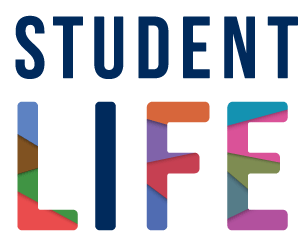Getting to know people at a university as big as U of T can be hard, and it can be especially intimidating when it comes to your professors. But some of your instructors might just be looking for a chance to get to know their students.
Read Reaching out to Instructors (PDF) for guidance on how to connect with your professors.
Every professor is different. Just as students have different learning styles, your profs will have different teaching styles. Even though it might seem complex, there are many ways for you to get in touch with your profs to get to know them, and help them get to know more about you.
Where to start: The syllabus
For every course, the syllabus is more than just your outline. It’s also a guide to what your professor expects of you: important deadlines, assigned readings, and how to contact them. The style of the syllabus can also tell you about your professor’s style and personality. Is it brief and to the point? Or maybe it’s jam-packed with helpful links, assignment information and university policies?
- Look for posted office hours. If your class is large, your prof might assign a TA to help with email or office hours.
- If the office hours says “by appointment”, this means your prof doesn’t set a regular time, but will set up a time to meet as needed. If this is the case, send an email asking to meet and any questions you might have.
- Check for the course policies on things like extensions, late assignments, and missed work due to illness. Different professors might have different policies, especially if it’s a big class.
- Always check the syllabus or course website first whenever you have a question about something like a due date or assignment information. Most of the time you’ll find the answer you’re looking for.
Talking to professors
Kinds of questions to ask over email:
- Clarify something you don’t understand from lectures, readings, or assignments, to see if you are on the right track.
- Problems with the course website.
- Requests for a meeting.
- Requests for information on courses, programs, or graduate school.
- Any requests that the syllabus says should be done through email.
Email etiquette:
- Always use your official U of T email account. Your prof will recognize you more quickly with a “utoronto.ca” address instead of something like “diehard_drwho_fan@yahoo.ca.”
- In the email subject line, write the course code and the subject of your message, like “ENV100: question about Assignment 1”. This helps your profs find your message in their long inbox list, and helps them reply faster.
- Remember to use an appropriate opening and closing for your message. Start with “Dear Dr. Smith”, or “Hello Professor Smith”. Close with “Sincerely”, or “Thank you”. It shows respect and helps you present yourself well.
Email doesn’t work for everything. It’s not a way to catch up on something you’ve missed. Some questions are too big for email. But if it’s a really interesting big question your prof might ask you to come to office hours instead.
Office hours
Office hours are best for questions about:
- Assignments or concepts you are having trouble with.
- Understanding your grade on an assignment or test, since it is easier for your prof to work with you face-to-face to help you understand where you might have gone wrong, and what you might do differently on the next assignment.
- How to prepare for an assignment, test, or exam.
- Questions about courses you might like to take, applications, reference letters, or research opportunities.
- Trying to enrol in a class that’s full, or transferring into the class from another program.
Tips for attending office hours:
- Remember, even though it doesn’t seem that way, there are no stupid questions.
- Bring your lecture notes, readings, and anything else you’ve been working on, to show your prof what you’ve done so far and help you remember what to ask.
- Bring a friend with you if you both have questions.
- Come prepared to talk as well, not just listen and write down notes. Your prof will ask you questions to help you figure out how to answer your problem. Don’t be shy! You’ll learn a lot in the process.
- If your prof’s office hours are crowded and you’re worried you won’t have enough time, or you need to ask about something more personal (like an extension or special circumstances), try to make an appointment first over email to make sure you’ll have enough time or privacy.
Before or after class
It might seem easy to ask a question before or after class, but it’s usually the most rushed time for everyone involved. Before class, your prof is getting presentation materials and notes ready, and after class is when you’re probably worrying about getting across campus to your next class.
- Arrive on time so you can hear any announcements at the beginning of class that everyone will need to know, like assignment information or answers to common questions. One of these answers might be what you’re looking for.
- Remember neither you nor your prof have much time, so try to ask questions that will have a quick answer. Your prof might ask you to talk later in office hours if it’s something they need some time to think about.
- If your class is long enough for a break, try asking your question then instead of right at the beginning.
Course website
Quercus is a great place to find all your assignment information, grades, readings, quizzes, and all the updates from your professor. Some profs might use the online discussion boards or the web conferencing tool Blackboard Collaborate to meet with students. Your professor will let you know all the Quercus features that will be using.
Using online office hours:
- Find out what time your professor will be online. If it’s on Chat, you can be ready at home with all your books and notes. If it’s on Discussion Board, you can ask a question and check back for a response.
- Discussion Board responses will always be posted, so you can check back later during the term if you need the answer again.
- Don’t be shy. If you have something on your mind, someone else probably does too.
- It never hurts to say thanks for an answer. Online, your prof can’t tell who’s participating and who’s lurking, and it’s nice to hear feedback.
Social media
Some profs may choose to use social media for their classes, but don’t assume they will. Most will probably reserve things like Facebook pages for family and friends. Unless your prof says otherwise, think of social media as a place to hang out with friends, and Quercus is the place to be for class.
Talk to your profs
An important message from Christopher Strong and PROF (People Reaching Out to Faculty) about why you should take the time to visit your profs during office hours.
Late assignments, re-grades and extensions
Sometimes things don’t go the way you plan them. When this happens, talking to your prof can feel like a high-stress, high-stakes scenario.
Re-grades
- If you are frustrated with your grade, first read it over carefully to understand the comments. Check the solutions if any are posted. Check the class average to see how you did compared to the rest of the class. Ask your TA for advice.
- Don’t go to your professor to only demand more marks. Showing up angry will not help. Ask to help understand why you were given the grade, and calmly tell your prof why you think you deserve a different grade.
- If your grade doesn’t change, your prof or TA might be willing to give you more comments on the paper to help you improve for next time.
Extensions and late assignments
It’s important to hand in your work on time. Many profs don’t like to give extensions because they want to reinforce the importance of working to deadline, and then there’s the logistical nightmare of providing extensions for students in large classes. And sometimes, it might just be better to complete the work on time so you can get on with everything else.
- If you think you need an extension, ask as far ahead of the deadline as possible. This shows your professor you are thinking about your time management and are planning ahead. Also show the work you have already done on the assignment. This is more likely to succeed than a panicked email at 2 a.m. the night before the deadline!
- It’s best to make extension requests in person. Together you and your prof can talk about finding a solution and weigh the situation.
- Is there a late penalty? If so, consider accepting it. You might lose some marks, but it’s better than handing in something incomplete, or missing the assignment completely.
- If you are in a tough personal situation, like a medical emergency or a family crisis, talk to someone like your registrar, who can help you document the situation and make any petitions on your behalf to make up missed work.
-

Associated Services
CLSS Peer Mentor Appointments
Book a one-on-one appointment with a peer mentor or chat with a mentor online to get fast support and guidance. Learn more about CLSS Peer Mentor AppointmentsCLSS resource library
Explore our handouts and tip sheets on academic skills. Learn more about CLSS resource library




